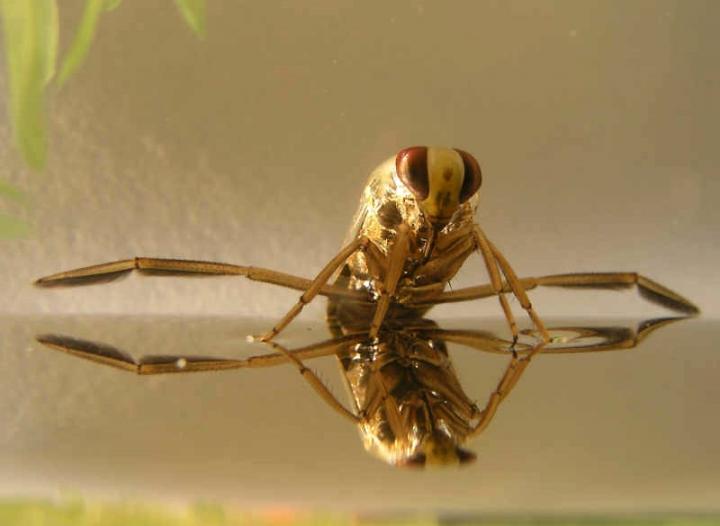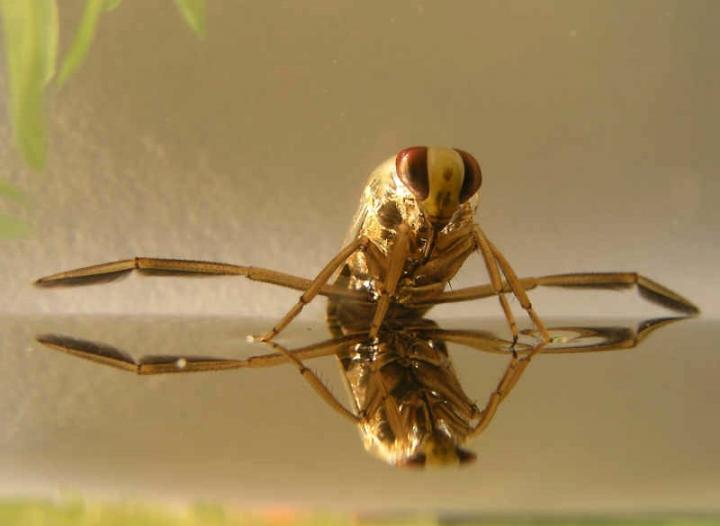
Credit: © E. van Herk
Mosquitoes continue to build resistance to existing pesticides. Research has now shown that the chemical substances emitted by one of the mosquito's natural enemies – the backswimmer – makes the biological pesticide Bti more deadly. These so-called predator cues also impair the mosquito's immune system. Scientists at KU Leuven (University of Leuven), Belgium, argue that a cocktail of biological pesticides and synthetic predator cues very well be the future of mosquito control.
Mosquitoes transmit quite a few deadly diseases, including West Nile Virus. Around the world, therefore, the fight against these insects is high on the agenda. Existing strategies for mosquito control often involve the use of pesticides that harm the environment. These pesticides are increasingly less effective as well, as insects can become resistant to existing products relatively quickly.
Biopesticides are a possible alternative. The most commonly used biological pesticide is the Bacillus thuringiensis israelensis (Bti) bacteria. Unfortunately, mosquitoes are already developing a resistance to this pesticide as well. This means we have to keep increasing the dose of Bti to kill mosquitoes, so that this biological substance, too, is beginning to harm the environment.
Under the supervision of Professor Robby Stoks, KU Leuven doctoral student Lin Op de Beeck set out to find a new strategy in the fight against mosquitoes. "We already knew that chemical substances emitted by the backswimmer – a natural enemy of mosquito larvae in the water – trigger a stress response in mosquitoes. This stress response, in turn, suppresses the mosquito's immune system," says Op de Beeck. "Scientists have recently found a way to produce a synthetic version of these chemical substances known as predator cues. We discovered that this synthetic version triggers a stress response in the mosquitoes and impairs their immune system, just like the natural predator cues."
This gave the researchers the idea to combine these synthetic predator cues with the biological pesticide Bti. "We developed a cocktail of predator cues and a low, non-lethal dose of Bti," Lin Op de Beeck continues. "The predator cues trigger extra stress, so that the Bti had a strong impact despite its lower dose. As a result, the mortality rates among mosquitoes were high."
As the predator cues of the backswimmer also have an impact on their targets' immune system, the cocktail weakens the mosquitoes and larvae that it fails to kill. "The surviving mosquitoes and mosquito larvae will probably have a shorter lifespan, so that the parasites they transmit don't have the time to complete their incubation period," says Op de Beeck. "As a result, the mosquitoes will transmit less diseases."
An additional advantage of this combined strategy is that synthetic predator cues of the backswimmer are not so difficult to produce, making the production of the Bti cocktail relatively easy and cheap.
"This new cocktail holds potential for a more efficient and more sustainable mosquito control. We need less Bti, so the impact on the environment is reduced and mosquitoes will be slower to build resistance," the researcher concludes.
This research was conducted in a lab environment. In a next stage, the cocktail will be tested in a more natural setting.
###
Media Contact
Lin Op de Beeck
[email protected]
32-163-73853
@LeuvenU
http://www.kuleuven.be/english/news?





